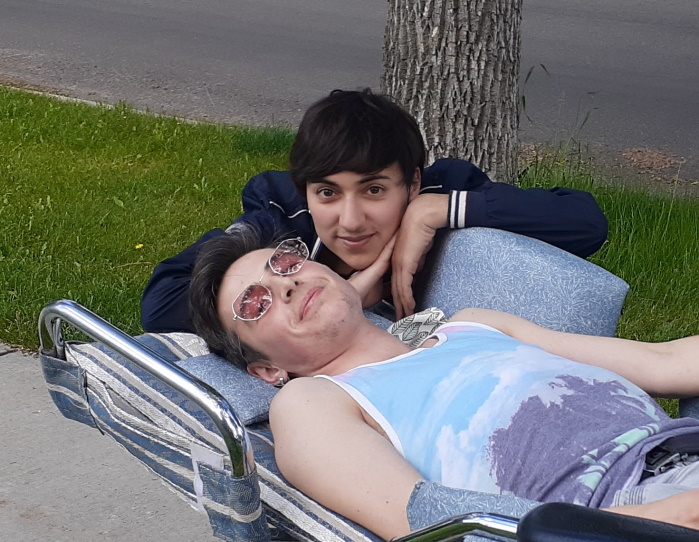Sometimes a word stops the ear
more effectively than an explosion.
Sometimes a word is a stone,
kicked aside by the heavy feet of the APA
and the policy committee on Family Values.
And sometimes a word is a land, foreign, alien,
you’ve heard about but would never visit,
until someone you love and trust travels there,
writes back with news.
Years ago, when I received the letter,
I packed without much planning, got my papers in order,
passed through the checkpoint and entered the country
where my daughter became my son.
It’s a country not unlike my own.
Bad weather and fare. Sorrow and joy,
bondings that sparkle and last,
others that burnout.
And it’s not at all like mine. It’s an exclave: enclosed
by passive territory with belligerent borders,
subjected to a thousand small aggressions,
too, occasional raids, shots fired,
frothing: Thing! Abomination!
And here, you can point to a shunt in time
when I, common evangelical Christian,
carried the conviction
that transgender was a pathology in need of a cure:
plain as Genesis, passage and verse.
And sometimes I wonder,
had I never known someone from that queer country,
and had retained my fundamentalist visa,
if my mind, dear God, my heart, would have been dislodged.
Mr. Berg, be not quick to gavel your verdict over this crowd.
And yet, and yet, disorder? Dear queerphobic-history,
how many precious lives,
long before Stonewall’s rising,
and tearfully long after,
have been pulled up by their roots
and cast on a heap at the fringe of humanity?
Consider the grace we cisgender take for granted,
which we count not as grace, but as nature;
how is it we disgrace Nature
by withholding it from others?
Consider too, since we all receive our selves
through the eyes of others,
what befalls a soul when so many eyes are averted.
I write this as an offering, a witness,
to the particular gifts of queerness.
I write as personal testament
that it takes no exceptional intelligence,
to see, when those of non-binary desire,
of gender fluidity,
are simply afforded the dignity
of abiding by their own identity,
we all flourish.
And sometimes (not only in June),
a word should be celebrated.


Your writings are filled with a quiet authenticity that is both humbling and anchoring
I am humbled by your words. Thank you Ananda.
Very thoughtful. This is an issue that I am struggling to understand and have not come to terms with.
Thanks Don, and thank you for your honesty.
As usual, Stephen, you go unflinchingly to the heart of the matter and come out better on the other side.
Thank you for such kind words Elize.
This poem makes us all “witness”. And such gifts, Stephen. Such gifts. “Let me count the ways….”
Thank you Terry Ann!
To you my friend,
This bit of beautiful –
“And sometimes a word is a land, foreign, alien,
you’ve heard about but would never visit,
until someone you love and trust travels there,
writes back with news.”
– has today, broken my heart
OPEN
in the most wonderful way.
Bless you my friend ?
funny when hearts come out as question marks – certainly no ‘question’ required in the word friend!
🙂 Not at all.
And bless you Tamara. Heart is warmed.
Oh, Stephen. Love this so much. Preaching reason, grace and so much love with poetry.
Cara, deeply honoured my poetic friend.
As always your words are masterful, life-affirming and drawn from the richest depths of love.
Thank you for this Pamela! So lovely to see your name and be reminded of your own kindness and thoughtfulness, and gentle and musical way of moving through the world.
Steve your words never fail to disarm and gently lead your reader. Thank you for being a trailblazer who tells the stories we need to hear.
Thank you Sue. Truly appreciate your encouragement.
So beautiful and moving, Steve. This poem lingered with me throughout the day after I read it, and I’ve come back to encounter your powerful words again. Thank you!
Thank you so much Mel. Your words are a blessing.
Thank you Stephen.
I can always rely on you to crank my heart open a notch or three…
<3
Thank you for reading Miriam, so grateful for your encouragement and kindness.
As mom to a transgender daughter I felt this in my body.
Thank you.
And thank you Kay, for reading and sharing. So very appreciated.
Thanks, Steve, masterfully described. Great pic at the top of this! I still recall the great comfort those two were when our Garry died. I read something recently that had me reflect on the “and” in the biblical “male and female.” Might it suggest a spectrum rather than a binary?
Thank you Sam, they are, as you know, a compassionate couple . Also I like that idea regarding a spectrum rather a binary.
Stephen, This is so insightful and powerful. Just yesterday at work, triggered by a rather unenlightened email request from a board member, a small team of administrators began talking about how important it is for us to sit down with and get to know someone of a different race, ethnic group, or country or someone who is at a different place along the gender spectrum. I think your writing can help us along our individual and collective journeys of being not only better allies, but better human beings.
Thank you so much Diane. That means a lot.